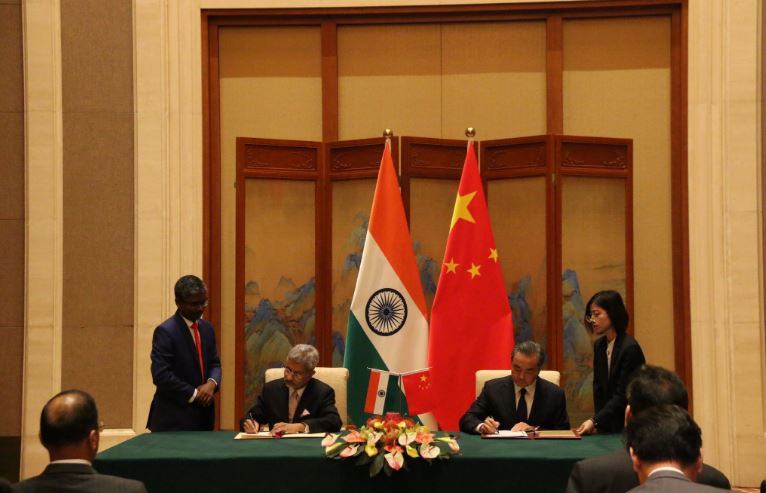Stage set for tomorrow’s polling in high profile Udhampur LS seat amid high security
Jammu and Kashmir has five Lok Sabha constituencies and each one will go to polls in separate phases because of security reasons.
Jaishankar earlier on Monday said that India and China ‘should not allow differences to hamper their bilateral relationship’.

External Affairs Minister S Jaishankar and Chinese Foreign Minister Wang Yi. (Photo: Twitter | @EOIBeijing)
India on Tuesday assured China that the change in the status of Kashmir is an “internal matter” and would have “no implication” for its boundaries with Beijing.
External Affairs Minister S Jaishankar conveyed to his Chinese counterpart Wang Yi that legislative measures were aimed at promoting better governance and socio-economic development.
“There was no implication for either the external boundaries of India or Line of Actual Control (LAC) with China. India was not raising any additional territorial claims,” he said in his bilateral meeting with Wang.
Advertisement
When the Chinese foreign minister referred to the rising tensions between India and Pakistan, the EAM said that the revocation of Kashmir’s special status and division of the state “had no bearing on Pakistan as it was an internal matter”.
The changes “did not impact the Line of Control”, he asserted adding that “where India-Pakistan relations are concerned, China should base its assessment on realities”.
S Jaishankar said that India, as a responsible power, “had shown restraint in the face of provocative Pakistani rhetoric and actions”.
“India has always stood for normalisation of the ties in an atmosphere free of terror,” he said.
Last week, China termed the creation of Ladakh Union Territory as “unacceptable and void”, and accused India of “putting Chinese territory in the western section of the border under its administration, which affects China’s territorial integrity and sovereignty.
Jaishankar, who is in Beijing on a three-day visit, held talks with Wang, and the two sides also inked four agreements, including cooperation in sports, cultural exchanges and traditional medicine.
Jaishankar earlier on Monday said that India and China “should not allow differences to hamper their bilateral relationship”.
He further conveyed to his Chinese counterpart Wang Yi that both sides should make a conscious effort to ease any tensions to ensure that “differences between us, if any, should not become disputes”.
In his remarks, Wang said China is closely following the escalation of tensions between India and Pakistan and urged New Delhi to maintain peace and stability.
He further stressed on the need to abide by the UN Charter, respect sovereignty and territorial integrity of all countries and address disputes through dialogue.
Jaishankar’s visit, which was meant to firm up the agenda for the second informal summit between Prime Minister Narendra Modi and Chinese President Xi Jinping, saw both sides also focusing on India’s moves on Kashmir – revocation of special status for J-K and splitting the state into two.
Ahead of his meeting with Wang, EAM S Jaishankar on Monday met Vice President of China, Wang Qishan, in Beijing.
China has been critical of India’s move on Kashmir calling it a “unilateral decision”.
It has also “assured Pakistan of its support and commitment” and announced that it supported Islamabad’s decision to approach the UN Security Council in the wake of India’s decision to scrap Article 370 of its Constitution that gave special status to Jammu and Kashmir.
Advertisement